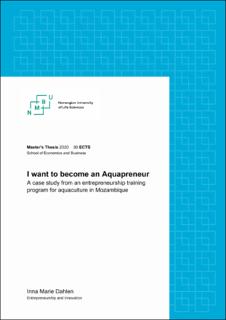| dc.description.abstract | Background: Aquaculture and tilapia farming in Mozambique are new markets and business opportunities. Papa Pescá is a private Mozambican company that has proven fish farming is a profitable business. In 2016 Papa Pescá started a collaboration with a Norwegian NGO and developed an entrepreneurial training program with the aim to train participants to become aquapreneurs, and in 2018 the program took in its first participants. Two years and 36 participants later, no students have started their own business within aquaculture.
Purpose: This dissertation has three purposes. First, it seeks to shed light on «Which factors limit the participants in the training program to start their own business within aquaculture? Secondly, this dissertation seeks to help Papa Pescá to improve and adapt their training program to prepare participants for meeting entrepreneurial challenges and opportunities. Researchers on entrepreneurship in Africa also call for more geographically specific research, and more research on entrepreneurship education and training. The third purpose of this dissertation is therefore to contribute to filling in those gaps.
Method: To answer the research question qualitative ethnographic methods have been used, among those methods in-depth interviews and observations. The informants in this dissertation are current and former participants at Papa Pescá´s entrepreneurship training program for aquaculture. The aim of the program is to give students experience of fish farming and relevant entrepreneurial knowledge and skills.
Findings: The research shows that participants have two career ambitions; employability and entrepreneurial intentions. Interestingly, they only fulfill employability. Research reveals that the program targets two different participant groups and program content is not adapted towards both groups. Additionally, the program is shown to lack relevant training input to prepare the students for entrepreneurial activity. Despite the shortcoming of the training program, the students express the will to become entrepreneurs. This ambition is further limited by contextual challenges like cultural attitudes towards entrepreneurship, financial challenges and inefficient bureaucracy. | en_US |

